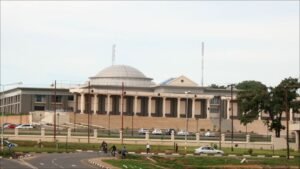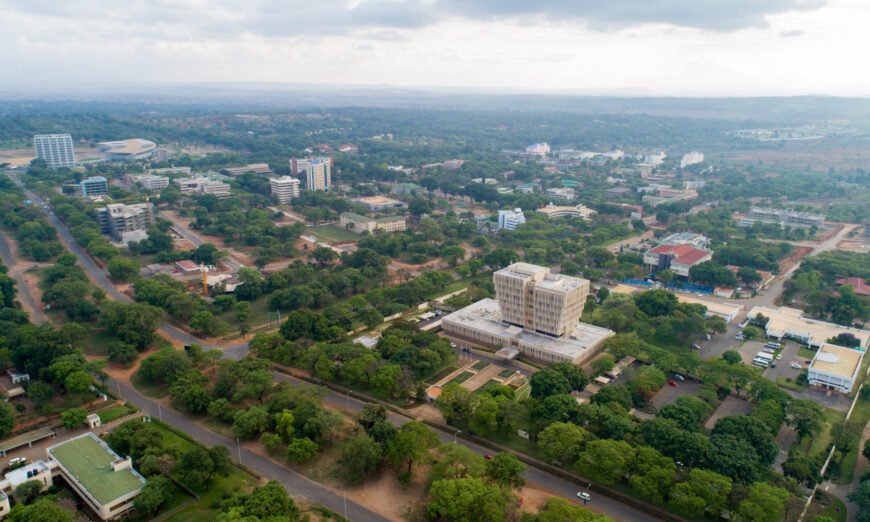 Lilongwe, the capital of Malawi, is a vibrant city that blends tradition and modernity, forming the heart of the nation’s political, administrative, and economic life. Named after the Lilongwe River that flows through it, the city has grown from a small trading post into a bustling metropolis with a unique dual structure: the Old Town and the New City. As the capital since 1975, Lilongwe symbolizes Malawi’s forward-looking vision while preserving its rich cultural essence.
Lilongwe, the capital of Malawi, is a vibrant city that blends tradition and modernity, forming the heart of the nation’s political, administrative, and economic life. Named after the Lilongwe River that flows through it, the city has grown from a small trading post into a bustling metropolis with a unique dual structure: the Old Town and the New City. As the capital since 1975, Lilongwe symbolizes Malawi’s forward-looking vision while preserving its rich cultural essence.
Located in the central region of Malawi, Lilongwe enjoys a strategic position that links it efficiently to other major cities such as Blantyre and Mzuzu, as well as neighboring countries including Zambia and Mozambique. Its temperate climate, rolling hills, and green landscapes give it a tranquil, livable atmosphere that attracts both locals and expatriates. The city’s well-organized layout, ample greenery, and growing skyline reflect Malawi’s gradual but steady urban transformation.
Lilongwe is not just the political hub of Malawi, hosting the Parliament and State House, but also a center of diplomacy, home to numerous embassies, including those of India, the United States, China, and Germany. It also houses several regional offices of international organizations such as the United Nations and the African Union, making it a vital link in global cooperation efforts.
Tourism in Lilongwe offers a subtle charm, with experiences grounded in culture, nature, and community life. One of the most visited spots is the Lilongwe Wildlife Centre, an urban sanctuary for rescued animals set in a forest reserve. Visitors can observe primates, antelopes, and birds in a natural habitat, and also engage in educational tours and conservation activities. The nearby Nature Sanctuary provides peaceful walking trails along the Lilongwe River.
Old Town retains a distinctly African flavor, bustling with open-air markets, local eateries, and shops. The Central Market is a must-visit for anyone wanting to experience the vibrancy of Malawian daily life—offering everything from fresh produce and crafts to textiles and traditional remedies. In contrast, the City Centre, also known as New Town, presents a modern look with government buildings, banks, luxury hotels, and international restaurants.
Kamuzu Mausoleum, dedicated to the founding President of Malawi, Dr. Hastings Kamuzu Banda, is a landmark site that combines history and architecture. The serene botanical gardens, one of the largest green spaces in the city, offer a refreshing escape and are frequently used for picnics, educational tours, and photography. Art lovers can explore the Kumbali Cultural Village, which celebrates Malawian music, dance, and crafts in a community-based setting.
Economically, Lilongwe has grown into a commercial and financial nucleus, supporting agriculture, trade, banking, and small-scale manufacturing. It serves as a major agricultural trade center, connecting rural farmers to urban markets. The presence of regional offices of financial institutions, such as the Reserve Bank of Malawi and multiple commercial banks, strengthens the city’s financial services sector.
India has maintained strong commercial and development ties with Malawi, and many Indian-owned businesses operate across Lilongwe—from retail to hospitality and pharmaceuticals. The city also sees steady engagement in education, with Indian teachers and doctors contributing to local capacity building. In recent years, trade expos and investment forums hosted in Lilongwe have encouraged more foreign direct investment, including from Indian enterprises looking to enter Malawi’s emerging markets.
Infrastructure in Lilongwe is on an upward path, with ongoing projects in road expansion, housing development, and energy supply. The city is served by the Kamuzu International Airport, located about 25 kilometers from the city center, offering regional and international connectivity. Roads linking Lilongwe to Zambia and Mozambique have seen upgrades, improving logistics and cross-border trade. Urban infrastructure is being further modernized through public-private partnerships focused on water supply, sanitation, and affordable housing.
Lilongwe also houses major educational institutions such as the Lilongwe University of Agriculture and Natural Resources (LUANAR) and several international schools, making it an academic center in the country. Healthcare services have expanded in recent years, with improved facilities at Kamuzu Central Hospital and new private clinics catering to a growing urban population.
With its welcoming atmosphere, growing economy, and expanding urban development, Lilongwe stands as a city of opportunity. It continues to grow not only as the political seat of Malawi but also as a cultural, economic, and infrastructural hub that offers promise to its residents and international partners alike.

